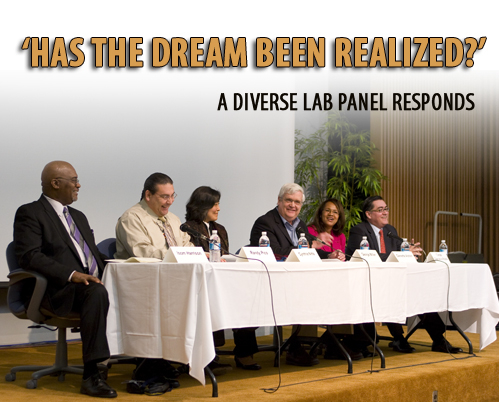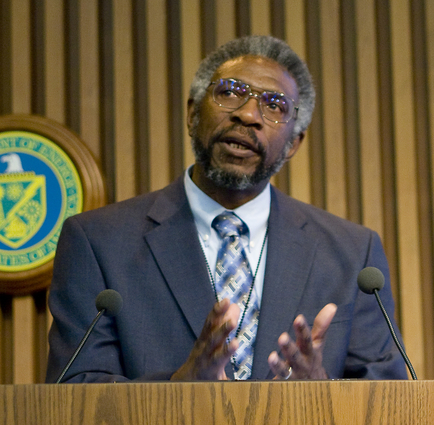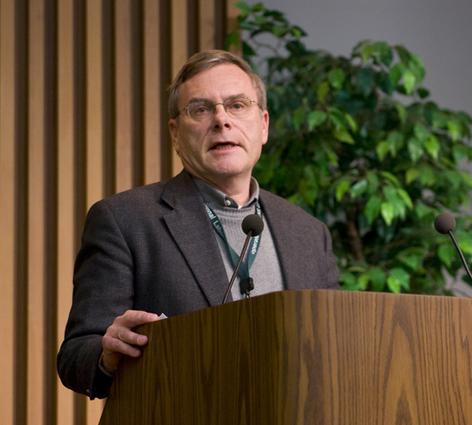Obama presidency inaugurates new thinking
The Lab’s annual celebration of Martin Luther King, Jr. coincided with the inauguration Tuesday of Barack Obama as the 44th President of the United States.
After opening comments from Jan Tulk, Laboratory counsel, the audience viewed segments from Dr. King’s iconic "I Have a Dream" speech delivered more than 45 years ago, alongside parts of President Obama’s inaugural address from that morning.
What followed was a candid discussion by a diverse group of six Lab managers who grew up in different places and times, acquiring a unique perspective of the nation and the world.
The group shared their personal stories of experiencing or observing discrimination and gave their viewpoints about what the election of Obama holds for America. In particular, they answered the question: "Does the inauguration of Barack Obama signify the attainment of Dr. King’s dream?"
The panelists included: Isom Harrison, Library Division Leader who has been at the Lab 30 years; Randy Pico, Laboratory Functional Area manager for Training and Qualification, who has been at the Lab for 26 years; Cynthia Nitta, Primary Design group leader and Campaign 1 (Primary Assessment Technologies) Manager, who has been at the Lab for 24 years, George Miller, Lab director, who has been at the Lab for 37 years, Glenette Alston, Department Head, Safety Training and Information Technology in the ESH&Q organization who has been at the Lab for 1 year, and Tomás Díaz de la Rubia, principal deputy, S&T Principal Directorate and Laboratory chief research and development officer, who has been at the Lab for 20 years.
Harrison, an African American who grew up in Mississippi during the 1950’s and 60’s said, "I have a different perspective than most of you." He said he believes Dr. King’s dream has not yet been fully attained. For example, during the campaign, Obama was not always judged solely on the content of his character, but rather, he was questioned consistently about his eligibility as a candidate, his heritage and his experience as a leader.
"We’ve come a long way, but there’s more work to be done," Harrison said. "We can’t be satisfied. Diversity is no longer a program, but a pirorty."
Pico, grew up in Southern California on an Indian reservation. "Martin Luther King meant a lot to me. I looked up to him," he said. Pico believes that Obama will make a dfference. "Change has come, but there is still a lot of work of to do. And, I will spend my life doing it," he vowed.
Nitta said she was "humbled and grateful" to be a witness to the inaugural events. "For me, this day reaffirms faith in American greatness."
She explained that her relatives were subject to Japanese internment camps, at the end of World War II. "We’ve moved from segregation to this moment and we have gratitude to those who came before us."
Miller was born in Mississippi, although raised in Washington, D.C. He has strong recollections of arriving at train stations in the South, and seeing separate water fountains there marked for blacks and whites.
He recalled the heroes of his time: John F. Kennedy and Martin Luther King, who "challenged us as a country and as individuals." He believes the election of Obama for most people was about character and capability.
"This is a step along the journey," Miller added, "Not the end of the journey."Glenette Alston grew up in the 1960’s in Louisiana. Her background is African American, American Indian and Creole. She remembered what it was like to be bused to school in the fourth grade and experience racial discrimination. She called Obama’s election opening the door to Martin Luther King’s dream. "Something bold has happened," she said. "Obama brings a lot to the office. He pushed the vision to another level. Change takes time."
De la Rubia agreed. "Yes, there has been progress, but we cannot rest on our laurels. Martin Luther King would be proud and hopeful. But, there is more work ahead," he said particularly noting immigration reform.
"President Obama needs our help. We must work for a more perfect union," de la Rubia added.
Tommy Smith of the Director’s Office of Strategic Diversity programs served as the panel’s moderator. "Obama’s election and presence will change people’s thinking," he concluded.
The program ended with closing reflections from Deputy Director Steve Liedle, who noted that much of what Dr. King spoke of in his dream is consistent with our understanding of what it means to be a good, decent people.







